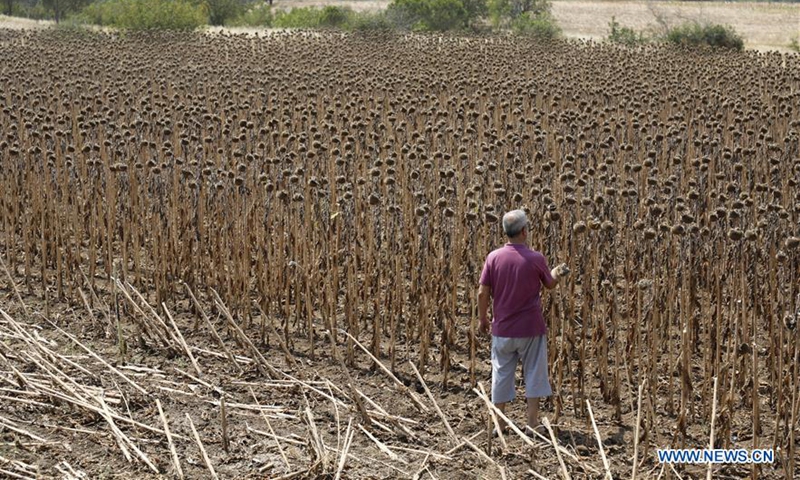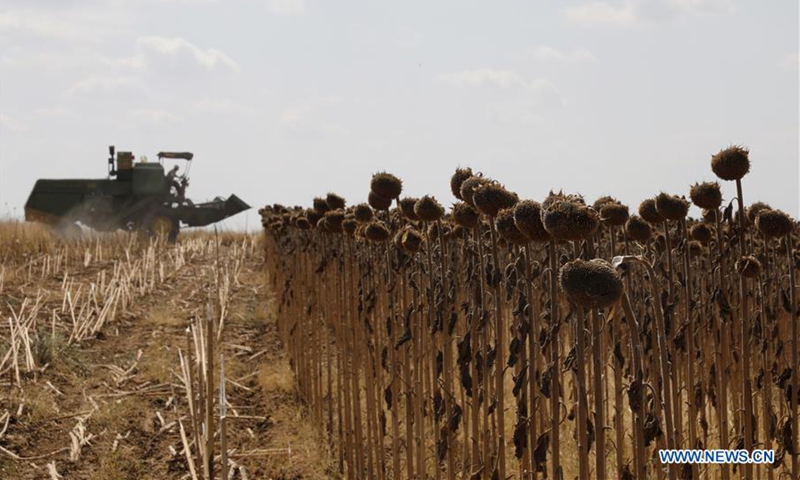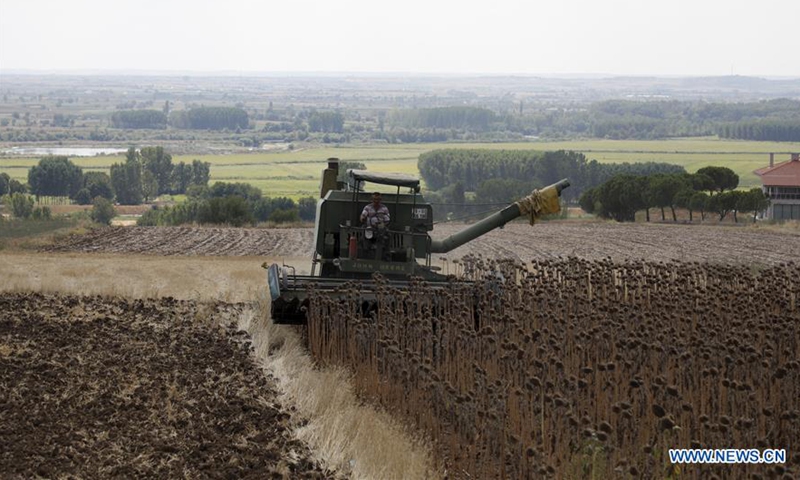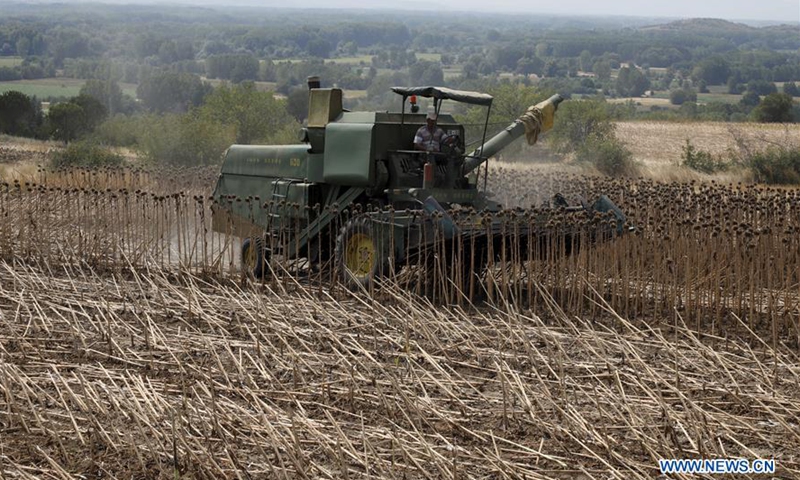Feature: Turkish sunflower farmers saddened by lower yields in harvesting season

A farmer checks a sunflower field in the province of Edirne, Turkey, on Aug. 26, 2020. Sedat Kacar, a Turkish farmer who owns two fields in a location near the Turkey-Greece border in Edirne, was saddened by the expected yields loss due to extreme weather this year, at a time when the country has already been hit hard by the raging COVID-19 pandemic. (Photo by Osman Orsal/Xinhua)
Sedat Kacar, a Turkish farmer from the province of Edirne, had a heavy heart as he was busying with sunflower harvesting on his fields in the northwestern end of Turkey.
Kacar, who owns two fields in a location near the Turkey-Greece border in Edirne, was saddened by the expected yields loss due to extreme weather this year, at a time when the country has already been hit hard by the raging COVID-19 pandemic.
In addition to the adverse economic effects of the pandemic, Kacar said that this year the sunflower farmers in the region have also been struggling against extreme heat and aridity, which reduced both the quality and yields of their products.
"This area did not receive enough rain during the winter months," Kacar told Xinhua, noting that extreme weather temperatures led sunflowers to get matured early, leading to lower yields.
He expected to collect 1.5 tons of sunflower seeds from his land of 10,000 square meters (about 2.47 acres), which would bring in about 5,250 Turkish liras (about 715 U.S. dollars).

A farmer harvests sunflowers in a sunflower field in the province of Edirne, Turkey, on Aug. 26, 2020. Sedat Kacar, a Turkish farmer who owns two fields in a location near the Turkey-Greece border in Edirne, was saddened by the expected yields loss due to extreme weather this year, at a time when the country has already been hit hard by the raging COVID-19 pandemic. (Photo by Osman Orsal/Xinhua)
This year the lowest buying price of sunflower seeds was determined by state institutions as 3,240 liras per ton, up from 2,500 liras in 2019.
Meanwhile, the costs of the farmers in the area have increased significantly from last year as the prices of seeds, fertilizers and pesticides were all paid in dollars, according to Kacar.
"As the Turkish currency loses its value against the greenback, the money we spend increases automatically," he noted.
Kacar will try to sell his products at a commodity exchange market this time, where the sales are auctioned, hoping to get as much as 3,500 liras per ton.
For Erdal Akgun, the former chairman of the Edirne Chamber of Agriculture, this year sunflower farmers stated their harvesting in a "blue" mood.
He said the insufficient rainfall didn't feed the soil enough, and therefore, sunflowers couldn't abundantly store the water and as a result, they got dried up.
"There is no other remedy to cope with the drought other than developing several irrigation methods, otherwise, no single sunflower farmer would be able to pay his debts," Akgun told local broadcaster Edirne TV in an interview.

A farmer harvests sunflowers in a sunflower field in the province of Edirne, Turkey, on Aug. 26, 2020. Sedat Kacar, a Turkish farmer who owns two fields in a location near the Turkey-Greece border in Edirne, was saddened by the expected yields loss due to extreme weather this year, at a time when the country has already been hit hard by the raging COVID-19 pandemic. (Photo by Osman Orsal/Xinhua)
The fields in this border province supplied 30 percent of Turkey's edible oil needs in 2019.
The country's total sunflower seeds demand, meanwhile, stands at about 3 million tons per year, according to Okan Gaytancioglu, deputy of the Republican People's Party in Edirne.
However, Turkey only produced 1.95 million tons of sunflower seeds last year, far below its total demand.

A farmer harvests sunflowers in a sunflower field in the province of Edirne, Turkey, on Aug. 26, 2020. Sedat Kacar, a Turkish farmer who owns two fields in a location near the Turkey-Greece border in Edirne, was saddened by the expected yields loss due to extreme weather this year, at a time when the country has already been hit hard by the raging COVID-19 pandemic. (Photo by Osman Orsal/Xinhua)
Citing that the COVID-19 pandemic showed that there could be sudden disruption in the food supply chain, Gaytancioglu urged officials to support sunflower farmers with a more rational pricing policy so that Turkey can increase its production and reduce dependence on imports.